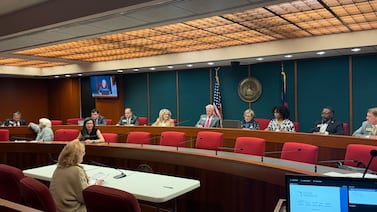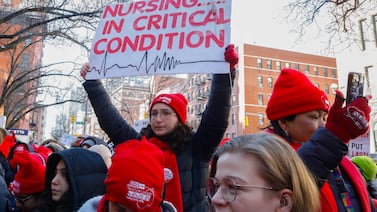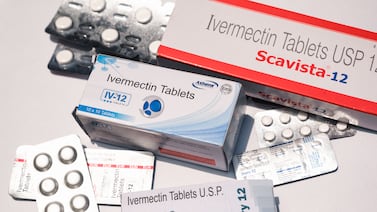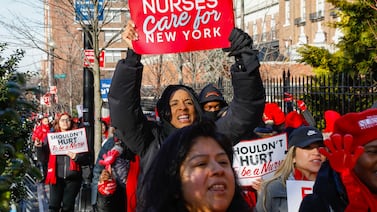This article originally appeared at Your Local Epidemiologist New York. Sign up for the YLE NY newsletter here. Public health, explained: Sign up to receive Healthbeat’s free New York City newsletter here.

It’s been a whirlwind week in public health. From shifting Covid-19 vaccine recommendations and a debate over Tylenol and autism, to declining Covid levels in New York and even a case of eastern equine encephalitis, there’s a lot to sort through. Here’s what you need to know this week.
Infectious disease ‘weather report’
Covid is past its peak in New York
Forecast: Moderate and declining as measured by wastewater data, signaling that we’ve made it through the worst of the summer surge.
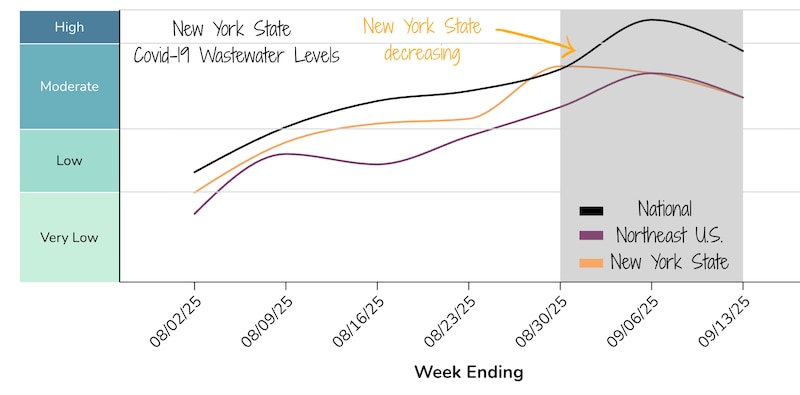
Covid hospitalizations are still elevated. Because wastewater is a leading indicator and has just started decreasing, we can expect hospitalizations to follow and begin decreasing in the next week or two.
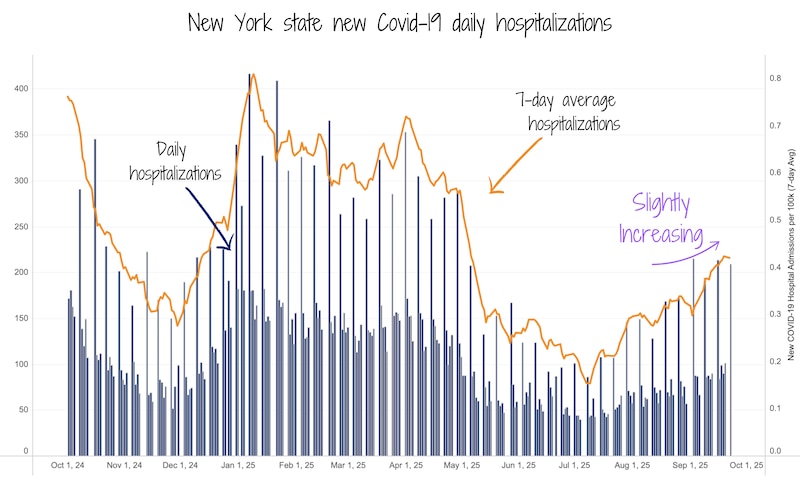
The flu
Forecast: No activity in New York yet.
All states, including New York, are at the minimal influenza-like illness level, and New York wastewater shows no flu activity.
I’m planning on getting my flu shot this week before I travel out of the country in early October.
RSV
Forecast: No activity in New York yet.
Wastewater and hospitalizations still show no RSV activity in New York.
Nationally, we moved from 0 hospitalizations per 100k to 0.1, which could be a very early sign that the season is starting or about to start.
Mosquito-transmitted viruses
Human infection of eastern equine encephalitis virus in Central New York
Last week a resident of Madison County was hospitalized with eastern equine encephalitis, a virus transmitted by some species of mosquitoes. This is the county’s first ever human EEE infection. EEE is rare in New York and the rest of the United States — last year, New York had its first human case since 2015 in a resident of Ulster County, who sadly died.
Most people infected with EEE won’t have any symptoms. But for those who develop symptoms, the illness can be severe and involve inflammation of the brain (encephalitis) and spinal cord (meningitis).
- About one-third of people who develop severe illness die.
- There is no specific treatment available.
- People over age 50 or younger than 15 are at greatest risk.
EEE is rare in New York, but is more concentrated in Central New York this year.
Since 1971, only 13 human cases have been identified in the state, including the most recent one. Of these patients, seven died.
By this time last year, 14 counties across the state detected EEE in mosquitoes, mammals, or birds. So far this year, EEE has only been detected in four counties: Madison, Onondaga, Oswego, and Oneida.
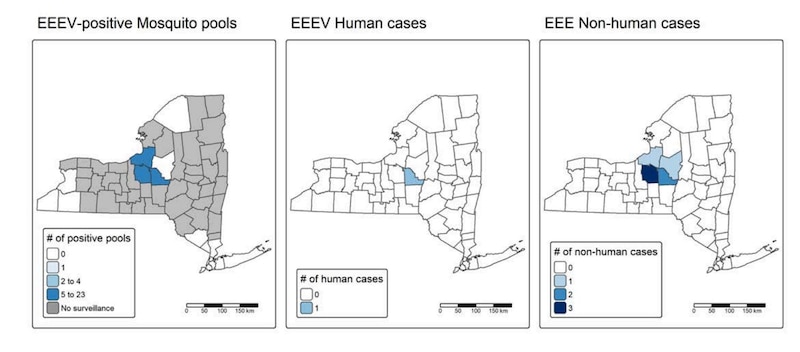
But more mosquitoes have tested positive so far this year compared to last. Even though there are fewer counties detecting EEE, the detections are more concentrated in a smaller area — there’s a hotspot in Central New York.
Prevention of EEE is the same as for West Nile virus: It’s focused on reducing the mosquito populations and avoiding insect bites.
West Nile virus is active across New York
The most recent data show mosquitoes tested positive in:
- Erie
- Nassau
- Onondaga
- Oswego
- Rockland
- Suffolk
- NYC: all five boroughs
So far, the number of human infections seen this year is comparable to the average of the previous three years.
What this means for you:
- Mosquito transmitted viruses are active right now.
- Protect yourself by wearing repellent (Deet or picaridin), long sleeves, or staying indoors when mosquitoes are most active at dawn and dusk.
- Dump standing water around your house to reduce mosquito breeding habitat.
Follow-up on ACIP meeting updates
I tuned into last week’s Advisory Committee on Immunization Practices meeting — and it was messy. Members openly said they weren’t sure what they were voting on, some votes had to be redone or skipped, and there was repeated confusion over whether certain issues even fell within ACIP’s jurisdiction.
That said, the outcome was more patient-friendly than many expected. Katelyn Jetelina covered the details in a recent YLE National piece here.
Here are the high-level outcomes:
Covid vaccines: ACIP shifted Covid vaccine recommendations to shared clinical decision-making for everyone aged 6 months and older. That means that the decision to vaccinate now falls to conversations between patients (or parents) and clinicians — whether your primary care provider, specialist, or pharmacist.
Depending on what state you live in, though, you may still need a prescription. ACIP’s guidance is now more broad than the Food and Drug Administration’s: FDA continues to classify the Covid vaccine as “off-label” for some groups (like healthy adults and children without underlying conditions). In some states, this ACIP/CDC vs. FDA mismatch could mean patients need a prescription to access the vaccine.
In New York, this discrepancy will not disrupt vaccine access. Gov. Kathy Hochul earlier issued an executive order that allows pharmacists to both prescribe and administer Covid-19 vaccines for people aged 3 and older without a patient-specific prescription. That law means that even under the new federal guidance emphasizing shared decision-making, folks in New York should still be able to get vaccinated conveniently, including via pharmacies.
What this means for New York: The executive order put forward earlier this month ensures continued access to Covid-19 vaccines in New York. The CDC basically recommended Covid-19 vaccines off-label (different from FDA’s recommendations). This off-label use means that pharmacists can’t administer them without special authority. In New York, the EO and standing order granted pharmacists that authority, even before the ACIP meeting, which means that you can get vaccinated at your local pharmacy. Most insurers — including Medicaid, Medicare, CHIP and major private insurers (AHIP, ACHP) — have also affirmed they will keep covering the vaccine.
New York joins the Northeast Public Health Collaborative
New York state and New York City joined Connecticut, Maine, Massachusetts, New Jersey, Pennsylvania, and Rhode Island in the Northeast Public Health Collaborative to share expertise and protect evidence-based public health. A cornerstone of the voluntary regional coalition is to collaborate on vaccine recommendations.
And they are already making moves. All states in the Northeast Collaborative have taken action through executive orders, legislation, or other means to decouple Covid-19 vaccine guidelines from federal rules, protecting access within their own states.
What we do and don’t know about autism and Tylenol
What was said at the presidential press conference earlier this week is not true: We do not have evidence that Tylenol causes autism. The largest and most rigorous study to date — a Swedish sibling study of over 2.5 million pregnancies — found no link between prenatal Tylenol use and autism when controlling for genetics and environment.
That said, the picture is more complicated. Some observational studies have reported associations between Tylenol use during pregnancy and autism. But others show that fever itself during pregnancy can increase risk, making it hard to know whether the risk comes from the medication, the underlying illness, or something else entirely.
The bottom line: This science is complex, and we don’t have a clear answer. What we do know is that the association is nowhere near as strong as it was described from the podium earlier this week. Many of the statements given were misleading or straight up false. On top of that, they also create stigma against our neurodiverse community members, and pregnant women who are doing the best they can to keep their babies and themselves healthy. Katelyn and Kristen Panthagani did a great job breaking it down here for YLE National.
For now, guidelines remain unchanged: Consult with your doctor, and if you need Tylenol during pregnancy, use the lowest effective dose for the shortest possible time.
Bottom line
You’re all caught up on New York public health news this week! And a happy 220th birthday to the NYC Department of Health and Mental Hygiene. 🥳
Love,
Your NY Epi
Dr. Marisa Donnelly, PhD, is an epidemiologist, science communicator, and public health advocate. She specializes in infectious diseases, outbreak response, and emerging health threats. She has led multiple outbreak investigations at the California Department of Public Health and served as an Epidemic Intelligence Service Officer at the Centers for Disease Control and Prevention. Donnelly is also an epidemiologist at Biobot Analytics, where she works at the forefront of wastewater-based disease surveillance.

